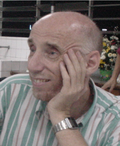Universiteit van Amsterdam / AMSTEL Institute
Reference centre
Universiteit van Amsterdam / AMSTEL Institute
Science Park 904
Postbus 94224
1090 GE Amsterdam
Netherlands
Contact person

Ed van den Berg
Science Park 904
Postbus 94224
1090 GE Amsterdam, Netherlands
Phone: +31 (0)20 525 7985
Secretary: +31 (0)20 525 7996
Fax: +31 (0)20 525 5866
E-mail: Please enable JavaScript to reveal the Email address
National website containing information about Fibonacci
AMSTEL - short overview
AMSTEL Institute was established 1999 as an Institute within the Faculty of Science dedicated to Mathematics and Science Education. Activities carried out by AMSTEL include research and development in Science, Technology and Mathematics Education from kindergarten through university, Teacher training, both initial as well as in-service, a two-years Master's programme Mathematics and Science Education, and many projects funded e.g. by the Dutch Ministry of Education and EC. Approximately 40 staff members are involved in the work of AMSTEL, in addition to several school teachers. One of its specializations is how digital Information and Communication Technology (ICT) can be used to support and enrich educational activities. Concrete examples are explorations and design tasks with easy sensor probes, programmable robots, and digital microscopes for primary schools, or video measurement (for example physics of sports) and graphical modelling for secondary.
Download this PDF for more detailed information about AMSTEL.
Activities within the Fibonacci project
- Transfer of knowledge about development of in-service course for teachers
- Transfer of knowledge about development and piloting of ICT enriched lesson materials
- Transfer of knowledge about research on teacher development (evaluation of in-service) and on learning with ICT
- Pilot for Greenwave.ie in the Netherlands
Other related projects
With respect to primary school: Together with its partners, e.g. teacher college HvA and NEMO science centre, AMSTEL contributes to primary schools amongst others through the following activities:
- Development of exemplary lesson materials with and without ICT
- Testing of up-to-date ICT technology for use in the classroom
- Passing on relevant experiences from other countries for use in Dutch primary schools (e.g. Pollen Project)
- Conducting in-service training including school-based in-service
- Networking with teacher education colleges in our region and advising on the science and technology education component of their curricula including advising on a minor specialisation in S&T
- Assisting schools in developing a comprehensive science and technology program from kindergarten through grade 6
- Jointly looking for possibilities to integrate subjects (example: our module on mirrors, our work on graphs)
- Networking with schools and teachers, teacher educators, companies, museums, and other organizations.
